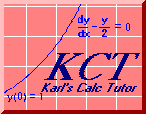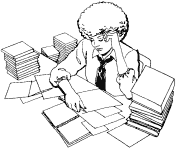

There are a few lucky folks who seem to learn even the hardest math almost effortlessly. The rest of us can only envy them and try to pick their brains. I doubt that you would be here if you were one of them. That means that you are like the majority of us who cannot learn math without working hard at it. Don't fool yourself into thinking that you can get by without working at it. You will only get yourself into more trouble than you can climb out of by mid-semester.
Tip 1: Do the homework exercises. Many professors do not require you to hand in the homeworks. The homeworks are for your benefit, not the professor's. You cannot learn to play the piano without endlessly practicing scales. You cannot make the football team without endlessly running windsprints. You cannot learn to paint without endlessly painting still lifes. Math is no different. The exercises will train your mind and sharpen your intuition. So do the work. It will pay off in the end.
 |
Tip 2: Math books are meant to be read slowly. Evelyn Woods never had to read a serious math text. You cannot speed read it and expect to get any benefit out of it at all. When you encounter a new concept in a math book, do not expect to understand it on the first reading, no matter how carefully your read it. You should go over each difficult paragraph several times. If you are still uncomfortable with it, read ahead a page or so, then come back to the difficult passage. And remember that math books are meant to be read with paper and pencil in hand. Use the paper and pencil to work through any steps that the book skips over.
Tip 3: Always use a pencil to do math homework (and exams). Don't ever try to do math in ink. You will make mistakes. Everybody does. So be equipped to clean them up. If you like mechanical pencils, great. If you prefer the old wooden kind, then sharpen several of them before you start each homework. Make sure you have a clean, usable eraser as well.
Although neatness might not get you extra points, it does help keep you from confusion. Keep your work organized. Skip a line (or even two) between each row of written calculations. You will be surprised at how much easier it will be for you to follow your own work when it's not so densely packed onto the page. Paper is cheap. Don't be afraid to use lots of it.
Tip 4: Your greatest assets are in the class with you. Your classmates are in the same boat as you. Organize a study group. Try to coax at least one of the top students in the class into your group. I recommend that the group size be three to five. Try to meet at least once per week. You will be working together on homeworks and comparing your lecture notes.
You don't want to be in the group that works on math in between beers and Monday Night Football plays. Choose as your group-mates those who have a serious attitude.
When you form the group, it might be a good idea to inform your professor that you have done so and who are the group members. You should explain that if all of you turn in the same wrong answer on a particular homework problem, it's because you worked on it together.
Tip 5: In your group activity, take turns. See if you can find a room with a whiteboard. Have one person get up and do a problem on the board, explaining what he or she is doing as the problem unfolds. If the person at the board gets stuck, the others in the group should try to provide hints or ask the person at the board telling questions. If the person at the board is doing fine, the others in the group should challenge him or her. Make the problem-doer justify each step orally. If anybody in the group does not understand a step, the person at the board ought to be able to explain it to his or her satisfaction.
When one person is done with a problem, somebody else gets up and does the next one on the board. And nobody weasles out.
Tip 6: You will be tested as an individual. Despite the helpfulness of your group activities, in the end your grade will be based upon your individual performance at solving problems. Following your group get-togethers, be sure to go solo on a few exercises.
Tip 7: Try to see more than just procedures. Again I urge you, learn the concepts, and the procedures will seem obvious. And try to have some fun with it. Humanity invented math largely because it is fascinating. Be fascinated.